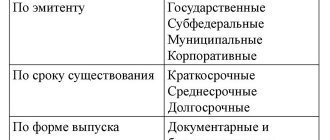All shares that are quoted on the stock exchange are necessarily included in the listing on the stock exchange. In other words, a listing on an exchange is a list of all assets that are involved in exchange trading.
Each exchange provides its own list, and nothing prevents shares that are included in the listing of one exchange from being included in the same way on other exchanges. Thus, the same securities can be traded on several exchange platforms, however, each of them differs in its list of traded assets.
Listing Criteria
Exchanges differ from each other in certain criteria for inclusion in the listing of shares, the main of which are:
- final price of the issuer's financial instruments;
- the issuer's net profit based on the results of operations over recent years;
- the size of the issue of shares that are included in the listing.
In addition, a particular exchange platform may differ in its own selection criteria. As an example, we should consider the main requirements that apply to an issuer that has expressed a desire to place securities on the Moscow Exchange.
Initially, it should be noted that the list of shares that are admitted to trading on the Moscow Exchange has three levels - the quotation list of the 1st, 2nd and 3rd levels. Let's consider the list of requirements:
- Securities placed on the list must comply with the regulatory requirements of the Central Bank of Russia and current laws.
- The prospectus must be registered.
- Information must be open in accordance with current Russian securities laws.
- Securities must be serviced at the Settlement Depository.
- The volume of securities issue should not be less than 2 billion rubles. This is necessary to include securities in the 1st level quotation list, and for the second level, at least 500 million rubles are required.
- The nominal price of securities should not exceed 50 thousand rubles.
- The company issuing securities must exist on the market for at least 3 years (1st level) and at least 12 months (2nd level).
- Accounting statements must be published for 3 years (1st level) and 12 months (2nd level).
- There should be no losses based on the results of activities for the last 2 years (1st level) and for the last year (2nd level).
- During the period of activity of the company issuing securities, there should be no default. If there was a default, then at least 3 years (1st level), and at least 2 years (2nd level) must pass from that moment.
- The issuer must have a credit rating equal to or higher than that established by the exchange. This applies to securities that must be included in the 1st level quotation list.
- The existence of a guarantee by the issuer, the amount of which is equal to or exceeds the total nominal value of all securities that are subject to inclusion in the list.
- The company issuing securities must appoint a shareholder representative.
- The issuer is required to comply with the Exchange's Listing Rules.
Securities listing
Listing is a procedure for entering a company's shares into the securities register of a stock exchange.
The procedure for listing securities is carried out at the initiative of the issuer , however, in some cases, listing occurs at the request of the exchange itself. We are talking about securities that are popular among traders and are distributed through informal channels.
Listing securities on the stock exchange provides the issuer with the following advantages:
- Attracting additional capital in the form of investor funds;
- Entering the international stock market;
- Rating assessment of the issuer;
- Increasing the investment attractiveness of the company;
- Increasing the liquidity of securities;
- Listing is an additional level of protection for depositors’ funds.
What are the benefits of listing for the issuer?
Listing is beneficial for a company issuing securities, primarily because the fact that its securities are included in the quotation list of any exchange allows it to attract additional investments. For example, it becomes possible at any time to release to the market part of the shares that remained in the ownership of the issuing company after the Initial Public Offering, having received the required funds for it, without bothering with banks and other financial and credit institutions.
Shares traded on the exchange floor are in a more advantageous position among investors, which cannot be said about securities traded outside the exchange. This factor has a positive impact on the price of shares, and as a result, on the level of market capitalization of the company that issues securities.
Issuing companies whose shares are traded on reputable exchanges, in addition to everything, have a rating, which also significantly increases their attractiveness to investors, increases the number of securities and increases market capitalization. Securities that attract investors are traded with higher activity, there is always demand for them, the degree of their liquidity increases, and, at the same time, the liquidity of the issuer’s assets.
What is a listing?
A listing is a category page on a website. It is a list of something (goods, services, tickets, etc.). Listing pages contain two or more items, rather than each item individually.
Listings play one of the key roles in attracting search traffic to a website. This is where keywords with mid- and high-frequency queries tend to be concentrated. The algorithm for how listings work can be represented as follows: listings help users (and search engines) quickly find the page of the desired product or service. As a result, user interaction with the site improves. In turn, this increases the likelihood of conversion. Complete conversions improve a site's behavioral search ranking factors, which improves a site's ranking for category queries leading to those pages. And, as a result, traffic for category queries increases.
What types of listings are there:
"Classic" listing. This is a familiar list displayed on a page where the main part is occupied by a grid of goods and services. Such a listing can be seen when viewing product categories, selecting by brand, filtering by characteristics, as well as in site search results.
Examples of classic listings can be found on almost every online store.
https://www.hansa.ru/catalog/plity/
https://williams-oliver.ru/online-store/all-for-a-bar-06422/
Hub listing. Such pages display the central categories of products/services or topics on the site and can combine several subcategories. Their task is to make it easier to select a subsection, help narrow down the choice and find the product you need. Hub listings are usually used for large online stores with a huge range of categories.
Example pages:
https://tvoydom.ru/catalog/mebel-dlya-doma-2/
https://www.ozon.ru/category/tovary-dlya-zhivotnyh-12300/
Listing landing page. It is used in the case when a complete network of goods and services will not help the user without initial clarification. The first screen of such a listing is a filter for selecting specific characteristics/parameters. A landing page is suitable when search results change too quickly or when it is impossible to provide a relevant answer without specifying the query. Landing pages are often used on ticket and hotel booking sites.
Example pages:
https://www.booking.com/
https://www.svyaznoy.travel/
Expert selections. In both content marketing and search engine optimization, there is a trend toward “expertise” and “authority.” Pages with a carefully researched selection of products and interesting comments on them are popular among site visitors. Such collections can successfully compete with classic listings both in Google and Yandex results.
Example pages:
https://peopletalk.ru/article/10-luchshih-shkol-parikmaherov-v-moskve/
https://www.chitai-gorod.ru/collections/408/
What are the benefits of listing for investors?
Listing a company on the stock exchange helps create the most positive conditions for stock trading. Due to the careful selection of issuers to be included in the quotation lists, exchange trading participants and investors do not have to worry about the reliability of the shares they trade.
The financial statements of issuers and many other information become available to everyone who participates in exchange trading, since their disclosure is considered one of the main conditions of listing.
The listing procedure allows the issuer to gain more trust and attractiveness from investors. Investors gain protection for their own interests by trading on an official exchange in accordance with strict rules established by the Central Bank of Russia and current legislation.
It is advisable to consume honey unheated, at room temperature. When heated, toxic substances are formed, which the body tries to get rid of through profuse sweating (which is what they use when drinking tea with honey in order to sweat).
If a child or family member is sick or has a severe cough, it is important not to cause harm.
You can drink water with lemon and honey in the morning, warm the water slightly. You can take a spoonful of honey in your mouth and wash it down with tea or water at room temperature.
Maximum permissible temperature for heating honey
— natural summer air temperature.
Necessary precautions when consuming honey:
- Do not mix honey with hot foods.
- Don't heat it.
- Avoid honey if you work in hot conditions and become overheated.
- Never mix honey with rainwater, hot and spicy foods, ghee, mustard and fermented drinks such as whiskey, rum, brandy, etc.
- Honey contains nectar from various flowers, some of which can be poisonous. Poison has hot qualities (Ushna). When honey is mixed with hot and spicy foods, the poisonous qualities increase and cause imbalance of the doshas.
In boiling water or hot tea, all the protein structures of honey immediately die. 42% and all protein amino acids simply coagulate,” a beekeeper with 30 years of experience “discovered” America journalists. – If you put honey in tea, it’s just like sugar. If you want a healing effect: honey - from a spoon and washed down with tea. And lemon is good. And also 15 grams of bee bread per day - this, as beekeepers say, is aerobatics.
At high temperatures, honey breaks down and turns into poison:
Oxymethylfurfural (OMF)
- an intermediate product of the chemical decomposition of sugars.
Easily formed from monosaccharides in an acidic environment. Chemical formula C6H6O3. Colorless liquid that turns brown during storage. Toxic, mutagen.
Honey contains hydroxymethylfurfural,
in natural honey, not heated, it is found in safe quantities.
Heating honey above 40 degrees begins to rapidly increase its quantity
; if you heat honey to 60 degrees, the OMP content becomes
hazardous to health.
Hydroxymethylfurfural has carcinogenic properties and affects the central nervous system, promotes the development of malignant tumors. Application of hydroxymethylfurfural (OMF)
Hydroxymethylfurfural is formed during the decomposition of sugars. Therefore, the quality of sugar-containing products is judged by its concentration, for example, the quality of honey is determined. The content of hydroxymethylfurfural is one of the criteria for establishing the shelf life of bee honey and for identifying its counterfeits. In accordance with GOST 19792-2001, the content of OMP in 1 kg of honey should not exceed 25 mg.
Sources and additional information:
- Honey in hot tea - benefit or harm;
- Hydroxymethylfurfural on Wikipedia;
- Honey in Ayurveda - therapeutic use;
- Oxymethylfurfural.










